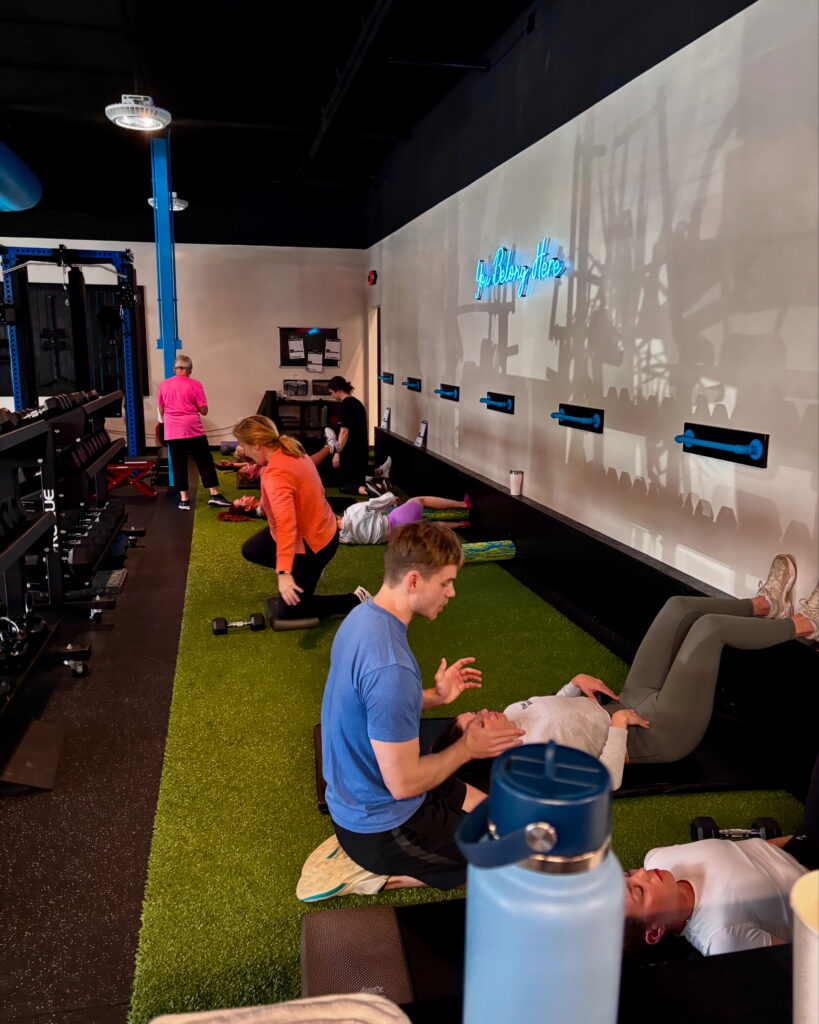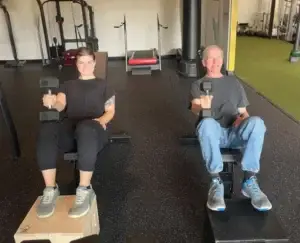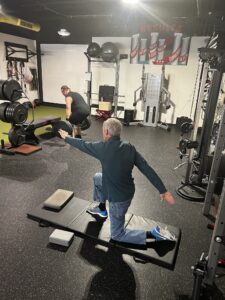The truth about healing no one wants to sell you: it’s slow, messy, and absolutely not meant to be done alone.
I wanted to share a client’s story about recovering from a really hard experience.
This is specifically about chronic pain, but this applies to any debilitating health journey: mental health, autoimmune conditions, hormonal changes… whatever you’re going through.
When you’re in the middle of it, It feels like there’s no way out. And trying to stay “solution-oriented” when you’re left to navigate it alone? Nearly impossible.
The more debilitating something is, the more support we need.
We need people to hold hope for us, especially in the moments where we can’t hold it for ourselves. We need people to nudge us, gently, into doing the things that help, even when those things feel out of reach.
When you’re feeling awful, the last thing you want to do is move, make a plan, try something new, or stay consistent with anything in hopes you eventually start to feel better.
When it comes to debilitating chronic pain, the things you need to do can feel scary, and that’s exactly why support matters.
From Debilitating Pain to 7 Miles on a Bike
About a year and a half ago, one of our clients was dealing with debilitating back pain. What this client did differently than most people was she kept moving throughout.
A lot of people miss that part. She didn’t just see doctors or consult a neurosurgeon, she also had people in her corner. Her physical therapist and I were there, helping her continue to move throughout a very painful experience.
At one point, she couldn’t sit for more than two minutes. She couldn’t stand, lie down, or walk comfortably. But she still moved, with our support. Even if it was just a little bit, she kept going, and I truly believe that gives you the best shot at fully recovering.
But I get it. As someone who’s dealt with debilitating pain myself, I know the last thing you want to do when you’re in it is move, or hear someone tell you to move.
When I was in a lot of pain, I dated one of the best physical therapists in our industry, and I screamed at him when he suggested I go for a walk while I felt like I could barely stand.
That’s why having professionals who know how to nudge you safely, and make it feel doable, is so important.
Fast Forward to Today?
This client came in and told me she biked 7 miles, walked for an hour, and was getting ready to have a session at our gym.
All in one day.
What a contrast, right?!
And I bet, if you had asked her at her lowest point if she thought this day would come, I bet she’d struggle saying yes.
When You’re in the Middle of It, Hope Feels Impossible
I know a lot of people stuck in their own personal storm feel the same way. They’ve tried everything and have lost hope.
That’s why it’s so important to hear stories like this.
There is hope.
….with a catch.
Hope Comes With Expectations
Healing from a health challenge, whether it’s pain, trauma, hormonal stuff, or burnout, takes time, patience, and a lot of trial and error.
It also takes setbacks.
Our client was on a long road filled with setbacks before she got from barely being able to move to biking 7 miles in one day.
On this journey, one week you’re feeling better, and the next week your symptoms come back with a vengeance.
And sometimes (most times)… the hard truth is that feeling better means facing the uncomfortable stuff:
- Unresolved trauma
- Bad habits
- Unhealthy relationships
- Toxic patterns
- Addictions
- Jobs that drain your soul
No supplement or back brace or pill can solve those things. So it makes sense why so many people lose hope. Because they’ve been sold hope in a bottle, and it didn’t work.
The real change comes from small, manageable shifts you can sustain over time. We only have so much capacity to take on a new routine or healthier habits, so expecting to become a completely healed person in a short amount of time is just setting yourself up for disappointment.
When in reality, that should be the normal expectation. But we’ve been sold lies through fancy marketing that make it seem like we’re just one supplement away from sleeping again, or one procedure away from getting our active life back.
What we should be selling is the long, hard, messy journey, the one filled with uncertainty, setbacks, and a lot of trial and error. And crying. Lots of crying.
I’m Here to Invite You Back to Hope
…but with a new perspective.
Don’t expect to feel better in a few weeks and stay better forever. Instead, sign up for the long, messy process of figuring it out.
That’s why support matters. You’re not meant to go through this alone.
And let’s be honest… your spouse can’t be the only one. Neither does your family. Because you don’t listen to them anyway (don’t worry, we all do it).
You need more than one source when it comes to support:
- Therapists
- Coaches
- Clinicians
- Mentors
- Trainers
- Friends
- Groups
This journey is long. It will test you. But it’s worth it.
And one day, you’ll look back and say…
“Remember when I thought I’d never feel better?”
Support Doesn’t Just Happen
You have to build it.
As I wrote this, I started thinking about the kinds of support people rely on to get through chronic pain, autoimmune issues, or mental health struggles. Coaches, therapists, doctors, groups, family… and then I hit that last one: friends.
That’s where my attention stopped.
We live in a time where friendship has been redefined as something that only exists when it’s convenient. We bail when we’re tired. Cancel plans because our “social battery” isn’t fully charged. Reschedule when life feels even slightly overwhelming.
We’ve made connection something that’s only allowed to exist when it requires little effort, no inconvenience, and no sacrifice.
And I get it. I’m an introvert who interacts with over 100 people a week. I need alone time. I go through seasons where I barely see friends because I’m protecting my energy and trying not to overextend myself, especially when life is chaotic.
But I also wonder…Have we subconsciously trained ourselves to only show up when it’s easy? And in doing so, are we losing the muscle it takes to build real, ride-or-die support systems?
If the norm now is to bail at the first sign of inconvenience, or skip connection because our battery isn’t fully charged, can we really be surprised that so many people feel lonely and isolated?
And then when life falls apart, all we’re left with is a therapist waitlist…
A strong, diverse support system is how we get through the hardest seasons of life. But it doesn’t just show up.
It takes work to build.
I’ve been thinking about that a lot lately. I’m going to start paying closer attention to when I truly need to decompress… and when I just need to say screw it and go to two social events back-to-back, because connection matters to me.
I have friends who consistently show up for me. And even though I’m wildly unqualified to care for children, if they needed me to take them for a whole month, because, I don’t know, one of them had debilitating pain and couldn’t move, I’d take their kids in an instant if it meant helping them heal.
Reflection Questions:
- Who do you have in your corner right now, people who would show up even when it’s hard?
- Are you allowing people to help you when you’re struggling? Or are you trying to do it all alone?
- Do your friends know you’re someone they can lean on when life gets hard?
- When was the last time you invested in building or deepening your support system?
- Have you mistaken convenience for connection?
- Are you expecting your spouse or one person to meet all your emotional and practical support needs?
- If your health took a turn tomorrow, who would be there to help your family?



